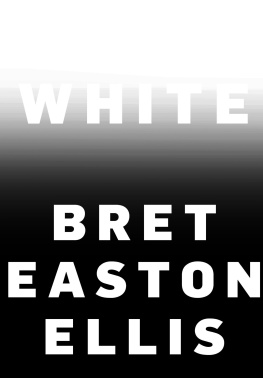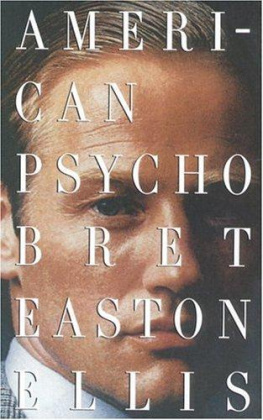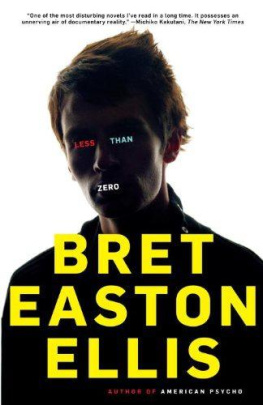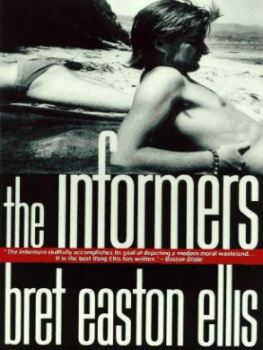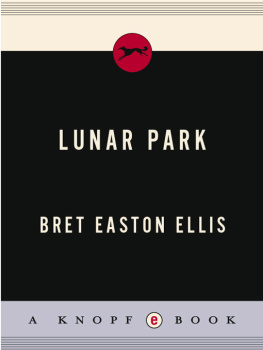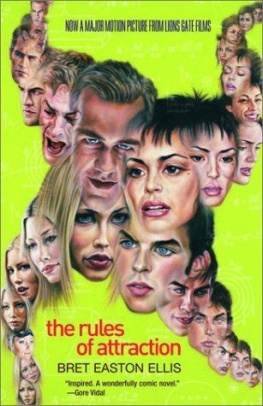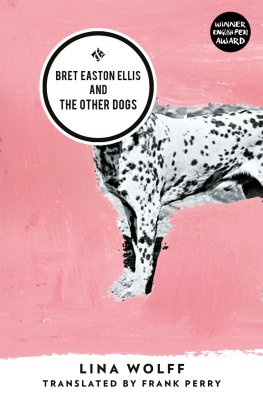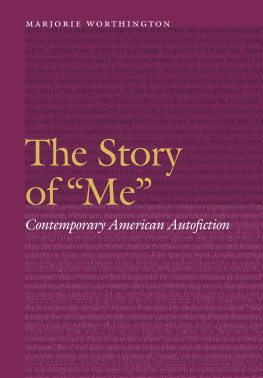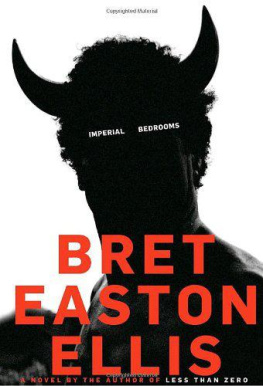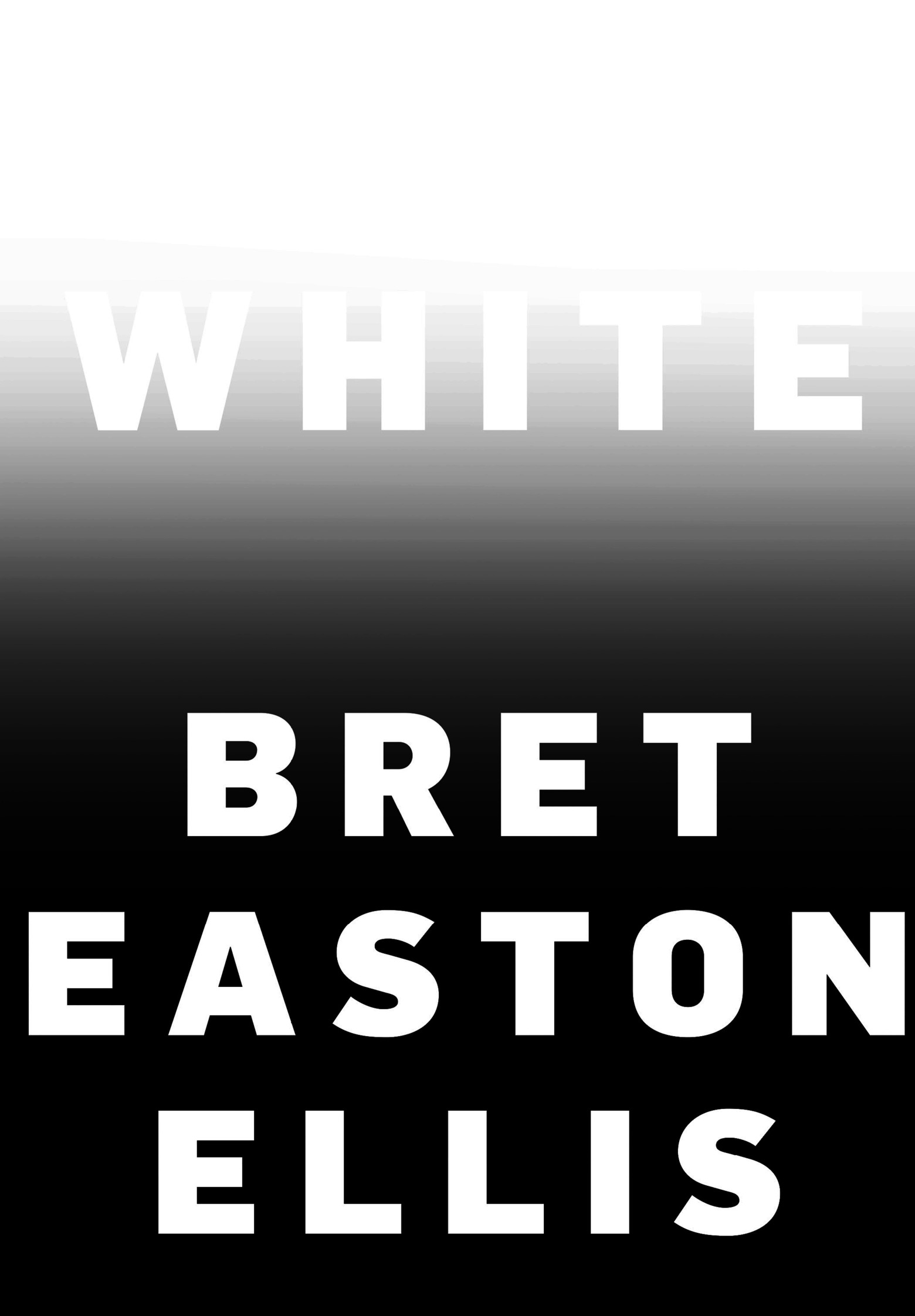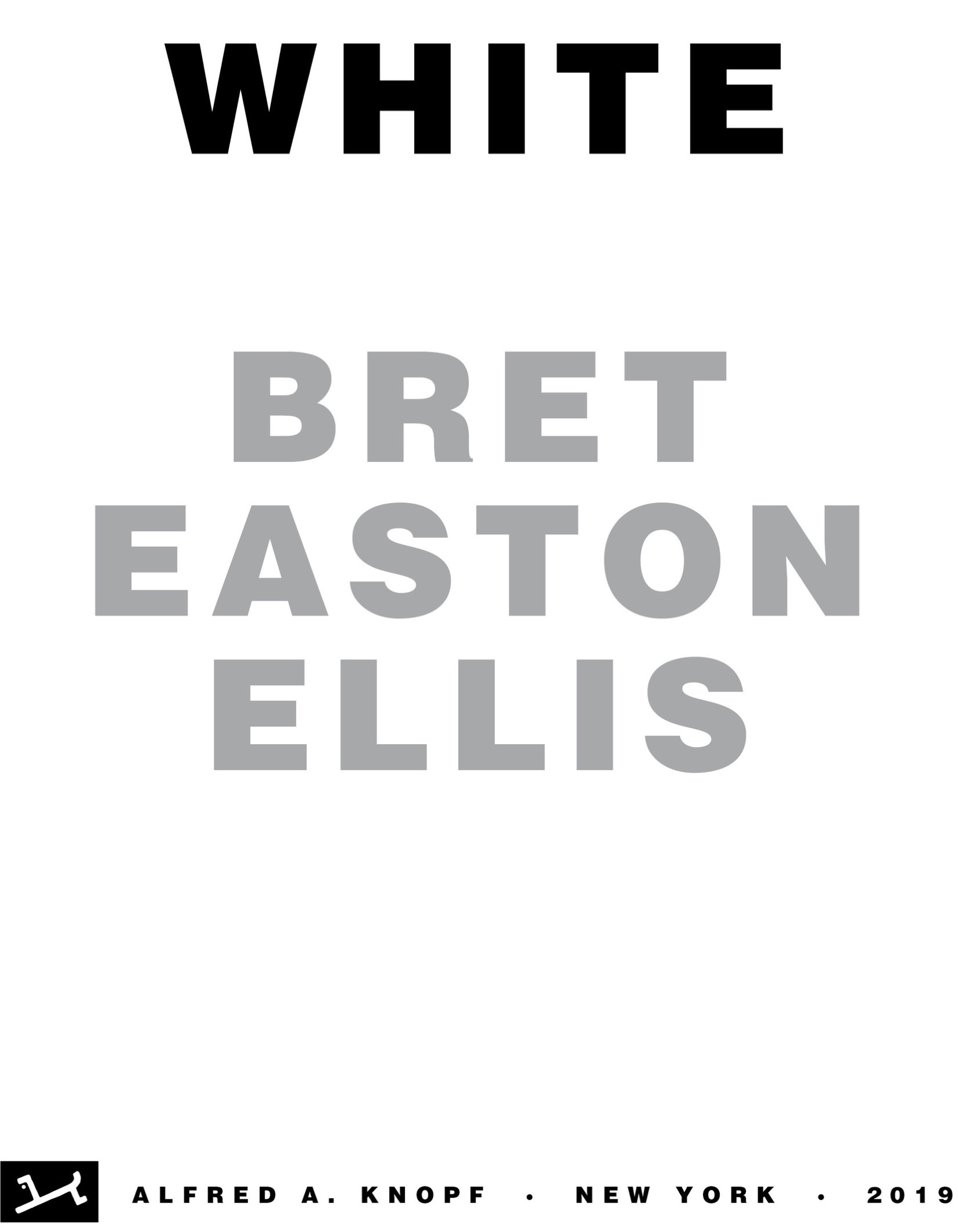ALSO BY BRET EASTON ELLIS
Imperial Bedrooms
Lunar Park
Glamorama
The Informers
American Psycho
The Rules of Attraction
Less Than Zero
THIS IS A BORZOI BOOK PUBLISHED BY ALFRED A. KNOPF
Copyright 2019 by Bret Easton Ellis Corporation
All rights reserved. Published in the United States by Alfred A. Knopf, a division of Penguin Random House LLC, New York, and distributed in Canada by Random House of Canada, a division of Penguin Random House Canada Limited, Toronto.
www.aaknopf.com
Knopf, Borzoi Books, and the colophon are registered trademarks of Penguin Random House LLC.
Grateful acknowledgment is made to Farrar, Straus and Giroux, and Janklow & Nesbit Associates, for permission to reprint an excerpt from The White Album, from The White Album by Joan Didion. Reprinted by permission of Farrar, Straus and Giroux and Janklow & Nesbit Associates.
Library of Congress Cataloging-in-Publication Data
Names: Ellis, Bret Easton, author.
Title: White / by Bret Easton Ellis.
Description: New York : Alfred A. Knopf, 2019. | This is a Borzoi book published by Alfred A. Knopf.
Identifiers: LCCN 2018050947 (print) | LCCN 2018055342 (ebook) | ISBN 9780525656319 (ebook) | ISBN 9780525656302 (hardcover) | ISBN 9781524711566 (open market)
Subjects: LCSH : American essays21st century.
Classification: LCC PS 3555. L 5937 (ebook) | LCC PS 3555. L 5937 W 48 2019 (print) | DDC 814/.54dc23
LC record available at https://lccn.loc.gov/2018050947
Ebook ISBN9780525656319
Cover design by Chip Kidd
v5.4
ep
Contents
FOR MATTHEW SPECKTOR
Society mediates between the extremes of, on the one hand, intolerably strict morality and, on the other, dangerously anarchic permissiveness through an unspoken agreement whereby we are given leave to bend the rules of the strictest morality, provided we do so quietly and discreetly. Hypocrisy is the grease that keeps society functioning in an agreeable way.
JANET MALCOLM, The Journalist and the Murderer
Somewhere in the last few yearsand I cant pinpoint exactly whena vague yet almost overwhelming and irrational annoyance started tearing through me maybe up to a dozen times a day. This annoyance was over things so seemingly minor, so out of my usual field of reference, that I was surprised by how I had to take a deep breath to dismantle this disgust and frustration that was all due to the foolishness of other people: adults, acquaintances and strangers on social media who offered up their rash opinions and judgments, their mindless preoccupations, always with an unwavering certitude that they were right. A toxic attitude seemed to drift off every post or comment or tweet whether it was actually there or not. This anger was new, something Id never experienced beforeand it was tied in with an anxiousness, an oppression I felt whenever I ventured online, a sense that I was going to somehow make a mistake instead of simply offering an opinion or make a joke or criticize someone or something. This idea would have been unthinkable ten years earlierthat an opinion could become something wrongbut in an infuriated, polarized society people were blocked because of these opinions, and unfollowed because they were perceived in ways that might be inaccurate. The fearful began to instantly see the entire humanity of an individual in a cheeky, offensive tweet and were outraged; people were attacked and unfriended for backing the wrong candidate or having the wrong opinion or for simply stating the wrong belief. It was as if no one could differentiate between a living person and a string of words hastily typed out on a black sapphire screen. The culture at large seemed to encourage discourse but social media had become a trap, and what it really wanted to do was shut down the individual. What often activated my stress was that other people were always angry about everything, presenting themselves as enraged by opinions that I believed in and liked or thought were simply innocuous. My pushback against all of this forced me to confront a degraded fantasy of myselfan actor, as someone I never thought existedand this, in turn, became a constant reminder of my failings. And what was worse: this anger could become addictive to the point where I just gave up and sat there exhausted, mute with stress. But ultimately silence and submission were what the machine wanted.
The idea of beginning a new novel started whispering to me sometime in the first weeks of 2013, while I was stuck on the I-10 in traffic merging into Hollywood after I had just spent a week in Palm Springs with a friend Id gone to college with in the 1980s, and who was now losing her mind. (She had broken down in front of me several times during those days in the house on Azure Court, before leaving earlier than expected to attend a Deepak Chopra retreat in San Diego. And, yes, I know how this sounds.) In Palm Springs I was unexpectedly crippled with waves of anxiety that kept me in bed for hours staring at my phonevague yet vast realizations about mortality that my friends frailties had activated and encouragedwhile also, absurdly, furiously going through the last demented round of notes on a pilot I was writing for the CW Network. Between the bouts of fear and the never-ending phone calls from the production company and the rewrites, the thought that I might never write another novel announced itself more loudly than it had in yearsand my last novel had been completed in 2009. Why this idea asserted itself at this particular time I cant tell you. The desire to write prose had kept pulsing faintly within me for years but not within what I now saw as the fake enclave of the novel. In fact Id been wrestling away from the idea of the novel for more than a decade, as evident in the last two books I published: one was a mock memoir wrapped within a horror novel, and the other was a condensed autobiographical noir I pushed through painfully during a midlife crisis, a story about my first three years back in Los Angeles futilely working on movies after Id lived in New York for almost two decades.
For those past five years I had no desire to write a novel and had convinced myself I didnt want to be constrained by a form that didnt interest me anymore. (And yet I was willing to be constrained by the conventions of the hundred-page screenplay that would never be made and the five-act TV pilot that would never be shot.) I had reiterated all of this firmly in interviews Id given over that period, during the world tour for that last novel Id written, at press junkets in Spain, in Copenhagen, in Melbourne. But out in the desert that feeling evaporated, and between the notes calls and the fear tamped down by Xanax and tequila, as the mountains surrounding the house darkened beneath the late-afternoon winter skies, the first paragraph of a novel began to take shape. It started with an image revolving around the bone-white Emser Tile sign situated on a rooftop at the intersection of Santa Monica Boulevard and Holloway Drive: the view from behind the windshield of a stolen car, a violent accident, an unfolding mystery, something about the past, that last year in high school, intimations of a murder disguised as a suicide, somebody pretending to be somebody he wasnt, an actor.

